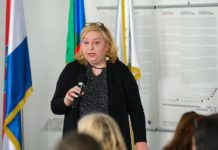Writer Maja Jovanović was born in 1984 in Odžaci in Vojvodina and today she lives in the village of Deronje in Vojvodina. For ten years now she has been working as a teacher of Rromani language with elements of national culture and tradition and as a teaching assistant at the “Vuk Karadžić”Elementary School. She has been writing poems since her earliest childhood, and has received numerous professional laurels and awards for her literary work.
When have you started writing poetry and who are your literary role models?
I fell in love with poetry from an early age, seeing my father, who being a writer himself has always been writing and creating. He recognised my literary interest and encouraged me to write as well. So with all my schoolwork, I always found time to write a new poem and that moment of creation was special to me. First time I put my emotions on paper was after reciting my dad’s poem Why at a municipal ceremony. The audience was delighted with the verses in Rromani language. I qualified for further competition and I was delighted. I represented my school at district and provincial competition, and all of my fellow students and professors supported me and were extremely proud of me.
I started researching through the media and with the help of my father and found out about several writers from Serbia and became acquainted with their work.
Sometime during high school, I was attracted by the work of Rromani poets from Serbia, and my role model was Gordana Đurić. I wanted to create my own style that is as natural to me as the air I breathe. I wrote love poems, poems about Rromani life and the secrets of female Rromani soul. I wanted to combat prejudices and stereotypes against Rroma women by writing about their experiences, their struggles, awarenesses and feelings.
When I started working as a school teacher, working with children provided further inspiration and I started writing children’s poems. It was enough for my students to tell me their dreams or tell me something that happened to them and a poem was born.
Has your poetry been published and who your intended target audience is?
In 2014, together with my father Rajko – Ranko Jovanović, I published my first collection of poems for children Children’s Poetry Book 2 / Điljarrni 2. The next collection was Children’s Poetry Book4 / Điljarrni 4 published in 2017, and to my delight and to the delight of the little ones who will read it this year Children’s Poetry Book 5 / Điljarrni 5 should be published. My children poetry books are meant for young children, primary school pupils and teachers, as well as for all those activists who work with children. The poems deal with different topics, for example, some are about family, others about nature, about animals or about love. They are rhythmically and melodically structured. At various events, such as International Rromani Day, International Women’s Day, or School Anniversary, children often and enthusiastically recited them.
I consider my most valuable project a collection of poems about life, love and human existence – The Wandering Heart / Phirut Jilo, which was published in 2018. I worked on it ever since high school and noticed that during that time I have matured as a poet and as a person and why I needed this long period before publishing it. Many of the poems from this collection got me out of my anonymity and provided numerous laurels and awards.
Have your poetry collections been published in Rromani language?
The collections are bilingual, Rromani – Serbian, which enables reading to a wider audience and provides an opportunity for anyone interested in Rromani literature to get to know it. I have noticed that there is an interest of the competent institutions of the majority community as well as other minority communities in the Rromani literature.
To what extent is Rromani culture recognised today in the countries of the region, but also around the world, and what is the role of writers in representing the entire Rromani culture?
Rromani culture is unknown to the Rroma people in the first place and then to other peoples in the region, Europe and the world. As such, it can only be accepted to a limited extent, so it results in its subordinate position, lack of quality and poor competition. By its historical and traditional cultural values, Rromani culture is part of the daily life and identity of the Rroma.
All the nations consider writers and poets as the “guardians” of cultural identity, while Rromani poets and writers, despite their rich, centuries-old cultural background, remain unrecognised on the cultural world stage. There was no one to write down and publish their works, so unfortunately, mostly they have not remained as a treasure for younger generations.
The poor economic situation and poverty among the Rroma community prevents the writers from presenting themselves to the general public, and regardless of the enviable quality that some of them posses, they can hardly escape anonymity. Therefore I conclude that the promotion of multiculturalism, which is so much talked about, is mere words and nothing more.
In October 2019, at the 26th International Amico Rom Arts Competition in Lanciano, Italy, you won the World Rroma Literature Award in competition with approximately 1000 poets and writers from around the world. You have also received other professional accolades so we would like to know how inspiring they are for your future work?
At the International Competition in Lanciano, I was awarded four years in a row in the category of Rromani poets. There are many award-winning greats of Rromani poetry among them, and to win an award among such a competition represents a great honour for me. I participated for the first time in 2016 and was the youngest participant at the time. I won first prize and I was delighted. In 2017, I won second prize and in 2018 third prize. Last year I shared a second place with my father, and we participated with our poems that talk about freedom, love, Romanipen…
During my literary work, I participated in numerous competitions because I wanted the poems in the Rromani language to be heard. Poems which were included and published in many competition and festival collections and almanacs. Each and every award represented an inspiration for my further work and I have passionately continued writing new poems in my mother tongue.
Are you familiar with the literary work of other Rromani poetesses and how important their contribution is to the establishment of Rromani culture?
I had the opportunity to meet many Rromani poetesses and writers as well as their work at various literary meetings and events. For the most part, they write about their lives, feelings and events they have experienced, and their works are full of emotions, deep and inspiring, and above all honest. Some have dedicated their work to recording and preserving Rromani treasure of the oral heritage from oblivion.
Rromani artists, such as Bronisława Weis Papusza, Ceija Stojka, Ilona Lacková and others, distinguished themselves throughout history and left a deep mark on Rromani literature. Some of them created in the aftermath of World War II, living in an environment that did not understood nor accepted them, let alone supported them. The Rroma community itself needs to become more familiar with their work, and then of course the majority communities, because their works are part of world literature. Many Rroma women do not even have the support of their families today. They have no one to encourage them and give them the opportunity to express themselves professionally and to promote their work. I fully agree with the statement that women must put twice as much effort into everything they do to be equal with men. It would be good if institutions, through various programs, supported the work of women and thus enable them to reach their full potential.
With my latest collection of poems, I wanted to portray the Rroma woman in the right light, the way she really is, what she faces and struggles with, what she feels, and whether she is alone in her endeavours or someone is helping her.
My family has always stood by my side, and so it is today. Every poem I write I read to them first and appreciate their comments and suggestions. Family, especially parents, taught me to be patient and persistent and to slowly build my artistic expression and find my place in society. They rooted family values in me and I am grateful to them for that. My living environment is multilingual and multicultural, with respect and tolerance among all of us.
Which poem would you choose for our Phralipen magazine readers as a closure of our interview?
I write children’s poetry and love poetry for adults. It is hard to single out one poem that is more special to me than others, but nevertheless for all your readers I give as a gift my poem Thoughts / Gindujra which won the first prize at the 2016 Lanciano Competition. I wrote it in one breath, and this is also an opportunity for me to remember its creation and the success it brought me.
GINDUJRA
Kana boldaman katar mande, trajto naj.
Kamav te džav, no či džanav kaj?
Kali si e farba, farba mungrre trajtosko
kaj si kale e jakha ćire thaj ćire balengo.
O muj ačhilo bizo peske farbako
thaj lošanimaske lolimasko.
Korri thaj korkorri phirav ando them,
bi tuko či džanav ko sem.
Gindosarav, kana paše mande najsan
kaj sa kava džal?
Baht si ćiro dujto alav
thaj vučimava phiravesla.
Me, učharrdi kalimava,
dromarav mungrre dromarnjava jasvinava.
Sar poresko barr si o jilo mungrro,
sa tutar thaj tu, sar učhalin ačhilo.
MISLI
Kad se osvrnem oko sebe, života nema.
Poželim da odem, ali kuda?
Crna je boja, boja moga života
jer su crne oči tvoje i kosa tvoja.
Lice je ostalo bez svoje boje
i radosnog rumenila.
Slepa i sama u svet koračam,
bez tebe ne znam ni ko sam.
Pomislim, kad pored mene nisi
čemu li sve ovo vodi?
Sreća je tvoje drugo ime
i ponosno ga nosiš.
Ja, obavijena tamom,
putujem sa mojom saputnicom suzom.












